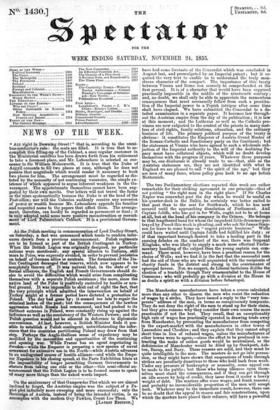On the anniversary of that Gunpowder Plot which we are
almost inclined to forget, the Austrian empire was the subject of a Pa- pist plot infinitely more sweeping and more successful ; only the Sovereign of Austria, instead of being the intended victim, is an accomplice with the modern Guy Fawkes, Count Leo Thun. We
have had some foretaste of the Concordat which was concluded in August last, and promulgated by an Imperial patent ; but it re- quired the very text to enable us to understand the truly mon- strous character of the compact. The importance of this treaty between Vienna and Rome can scarcely be comprehended at the first perusal. It is of a character that would have been supposed practically impossible in the middle of the nineteenth century ; and, no doubt, we shall only be able to appreciate the momentous consequences that must necessarily follow from such a prostitu- tion of the Imperial power to a Popish intrigue after some time shall have elapsed. We have submitted the Concordat to a de- tailed examination in a separate paper. It becomes law through- out the Austrian empire from the day of its publication ; it is law at this moment; and the Lutheran as well as the Catholic pro- vinces are now subjected to the control of the priests in many mat- ters of civil rights, family relations, education, and the ordinary business of life. The primary political purpose of the treaty is obvious : it constitutes the Emperor of Austria Grand Master of the Roman-Catholic and Reactionary party on the Continent ; but the statesmen at Vienna who have agreed to such a wholesale sub- jection of the Imperial authority to the will of the declining Pa- pacy must have collateral objects, which will no doubt develop themselves with the progress of years. Whatever these purposes may be, one disclosure is already made to us—that, able as the Austrian statesmen are, they are not identified with what in England we are pleased to call "the spirit of the age," but they are men of many faces, whose policy goes back to an age before Metternich.
























